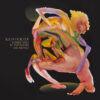Waxahatchee is big, her lore is huge, and her experience is vast. The sweep of her music spans through generations, although it’s not so obvious at first glance. Katie Crutchfield’s, let me use this word, mythology consists of a sprawling oeuvre, which she has been developing at an intense pace since 2004 when at age 15, she and her twin sister Allison formed The Ackleys. After that, they also founded Bad Banana and P.S. Eliot. Before her current venture, Crutchfield also ran her solo project King Everything, and let’s not forget about Plains, her recent duet with Jess Williamson, and Great Thunder. Not bad for a 20-year run, eh.
The reason I’ve started this take on her already quite solid legacy is that it’s the best angle for looking at her new, already sixth, solo effort Tigers Blood. Because in the last 7 years, since the release of her fourth record Out in the Storm, she has successfully broken all the rules carefully established for herself in the first 13 years. All her aforementioned projects, that preceded Waxahatchee, belong to the punk, emo, and ’90s indie universe with obvious influences from Elliott Smith, Bikini Kill, and The Raincoats. And the first three albums under her current moniker continued this course: American Weekend is a raw and lo-fi acoustic DIY effort, written and recorded in a full “bender”; Cerulean Salt, with its almost Rid of Me/To Bring You My Love cover, sounds very PJ Harvey in its sonics and overall atmosphere; and on Ivy Tripp we hear pure indie rock with sparse sparks of chamber pop.
Despite big success on the wave of all that indie fad of the early 2010s, in 2017, Crutchfield gently jumped off that train with the release of Out in the Storm which represented straight alt-rock with delicate nods to alt-country. This new approach was brought to perfection and finally cemented in the After Great Thunder EP, which she smartly called “a complete 180″. Music critics assumed back then that such a surprising left turn was “not a permanent stylistic shift”. Maybe that was the result of getting sober in the exact same year and, as she puts it, “facing all of this stuff that has been shoved deep down and covered in booze for years”. Maybe the cause was the bright and romantic relationship with Kevin Morby which started in that period. Or it’s just an inevitable process of becoming “wiser and slow and attuned”, as she sang on ‘Fire’.
However, Tigers Blood originates exactly there, being the sequel, the direct heir, the straight development of the Southern sound of Saint Cloud and Plains’ I Walked with You a Ways that preceded it. Thus, in exactly two decades, Crutchfield became the complete opposite of what she did in the first half of her career. Right now, with great pleasure and to the applause of a highly increased audience, she breaks her own basics and rules: distorted and hazy lo-fi tunes with blocky rhythms turned into sophisticated and lush balladry; all that dark gothy poetry in the vein of Linkin Park and Twilight movies changed to mundane lyricism; on-the-road lyrics about teenage struggles in the vein of Kerouac became more cozy and home-brewed; general rawness, doom, and loneliness gave way to self-confidence, calmness, peacefulness, and acceptance.
Now she is a gorgeous storyteller, an author of “fucking boring” music, an experienced singer of mundane things — more of a theatrical artist than a reckless indie rocker, touring in a trashy van with loads of booze and “flowered with nerves and shadows and truth”. Let’s compare. “I fill my jar up to the brim / I am an arid abyss / I’m an arid abyss”, she sang in ‘Dixie Cups and Jars’ 11 years ago, but in ‘Bored’ everything is completely different: “I keep my head up / Fill up your empty cup / All in the name of love”. “You are deaf and dumb and I am numb / And we’re illuminating”, she plaintively sobbed in ‘Lips and Limbs’ in the spirit of Chester Bennington in 2013. “You can take it pretty far on a prayer that’s pale & synthetic / bending my crowbar with tension that’s telekinetic”, she cheerfully and almost encouragingly sings now in ‘Crowbar’ now.
There are no cracking hooks or punchy lines on Tigers Blood, but its lyrics definitely became more wordy, wiser, and wider, while their meat feels more reserved, simpler, and down-to-earth, which makes Crutchfield’s songwriting approach way closer to timeless traditions of American music in the line right next to the best pupils of Lucinda Williams, Loretta Lynn, and even Joni Mitchell. What an irony that all these years the author of some of the most indie-ish records of our time, Cerulean Salt and Ivy Tripp, admired Blue, Car Wheels on a Gravel Road, and other folk and country music from her dad’s music library. Nonetheless, becoming more country-ish, she now sounds even more poppy than ever. As she told to Pitchfork, “When your profile rises, the door to pop, or that sound, opens, and it’s tempting to walk through”.
Indeed, it is! And she uses most of the opportunities to make her music even more saturated and nuanced. With the help of producer Brad Cook, who is also on bass here, and indie folk rising star MJ Lenderman from Wednesday, who greatly enriched the record with delicate electric guitar shuffles and vocal harmonies — she delivers a very bright, bouncing, and nostalgic sound, which is especially evident on ‘Evil Spawn’ where Lenderman poignantly and slightly shy harmonizes with her with the words “good old days”. The other nostalgia-tinted and highly atmospheric gem of the album is ‘Right Back to It’, where their voices tightly intertwine almost in the way of the best examples of musical duos like, say, ‘Louisiana Woman, Mississippi Man’, or even ‘Where the Wild Roses Grow’, if you will. This collaboration is already enough to get into the list of instant modern classics of Americana, but there are way more layers.
“My skin is airy thin / But my game is rigged to win”, she declares in ‘Bored’ to the soft and sneaking electric guitar licks before breaking into a squeal, and such Twain/Crow/Morissette-indebted vocal modulations are essential for her new role. Here and there, pop up some rock grooves (‘Ice Cold’), a lot of glimpses of indie from the mid-to-late ’00s, and even Iggy Pop–inspired ruminations about being bored (‘Bored’). The high-energy opener ‘3 Sisters’ is, maybe, the most universal example of intergenerational, borderline, sonics, because it easily could be both in the rotation of modern radio stations and on ’90s MTV among pop hits of that time like, say, Des’ree’s ‘Life’. With a lot of memorable details, markers of varied music eras, Crutchfield connects different generations, musical tastes of her parents, and also — her own past with the present, paving the way to the future.
Without this intersection, this overlay, it would be just another Americana album with acoustic guitar, banjo, pedal steel, and a bit of twang. The thing is, this 180 turn in Waxahatchee’s sonics doubled the size of her audience according to her rough calculations. Even if we compare the number of user scores on AOTY, Saint Cloud has more than one thousand against a few hundred for previous albums. Tigers Blood is up next. And this big leap from cluttered basements and small venues to the spotlight of Phoebe Bridgers’, Kacey Musgraves’, and Taylor Swift’s fans became possible thanks to this overlap of a few generations of guitar music in her new offering, which, in turn, is the result of Crutchfield’s advantageous position between the roots and indie music, between Mitchell’s and Bridgers’ conditional audiences.
Speaking of generations, Waxahatchee of the 2010s era and the one of the ’20s are completely different artists with their own agendas, struggles, and sonics — the older one has broken almost every rule of her younger version, but what still connects them is an emotional resonance and piercing honesty. And if they were to meet somewhere in the Folk Multiverse, they definitely wouldn’t face the so-called Turgenev’s fathers and children conflict and would understand each other from the first word, which makes Tigers Blood one of the few uniting and defining records of the moment, especially in the face of the recent trend of popularization of the roots music and its assimilation into the indie audience.




